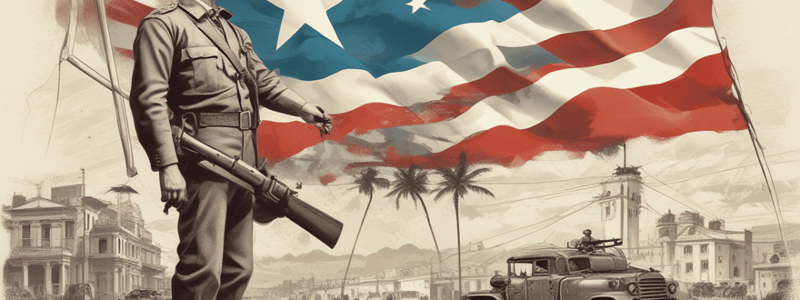Podcast
Questions and Answers
What fueled the movement to annex Cuba and encouraged filibustering?
What fueled the movement to annex Cuba and encouraged filibustering?
- The fear of racialized revolution in the United States
- The desire to expand the American business class
- The presence of a British abolitionist influence in the Caribbean and fears of racialized revolution in Cuba (correct)
- The popularity of Narciso López in Cuba
What was the outcome of the annexation of Cuba despite its popularity and military attempts?
What was the outcome of the annexation of Cuba despite its popularity and military attempts?
- It never succeeded despite great popularity and some military attempts (correct)
- It was successfully annexed and became a US state
- It was annexed but only for a short period of time
- It was partially annexed but later gained independence
What was the unique aspect of the annexation of Cuba in terms of manifest destiny?
What was the unique aspect of the annexation of Cuba in terms of manifest destiny?
- It was an attempt to recreate the story of success in Mexico
- It was the first time manifest destiny sought territory off the continent (correct)
- It was a direct result of the Mexican-American War
- It was the first time manifest destiny sought territory on the continent
Who led the military attempts to annex Cuba?
Who led the military attempts to annex Cuba?
What was the expectation of those guiding the filibustering effort in Cuba?
What was the expectation of those guiding the filibustering effort in Cuba?
What was the source of the information about Narciso López and the first clandestine U.S. war against Cuba?
What was the source of the information about Narciso López and the first clandestine U.S. war against Cuba?
Flashcards are hidden until you start studying
Study Notes
Filibustering and Cuba
- Filibustering gained significant attention in the American imagination as it looked towards Cuba, driven by fears of racialized revolution and British abolitionist influence in the Caribbean.
- The movement to annex Cuba was seen as a means to expedite the process, given the perceived lethargy of official negotiations.
- Those involved in filibustering believed that the Cuban population would be receptive to their efforts and that the American business class would be agreeable.
Narciso López and the Annexation Attempts
- Narciso López, a Cuban dissident, led military attempts to annex Cuba, but ultimately failed.
- The annexation of Cuba, despite its popularity, was unsuccessful.
- This marked the first time manifest destiny sought territory beyond the North American continent, aiming to put a unique spin on the success story in Mexico.
Studying That Suits You
Use AI to generate personalized quizzes and flashcards to suit your learning preferences.





